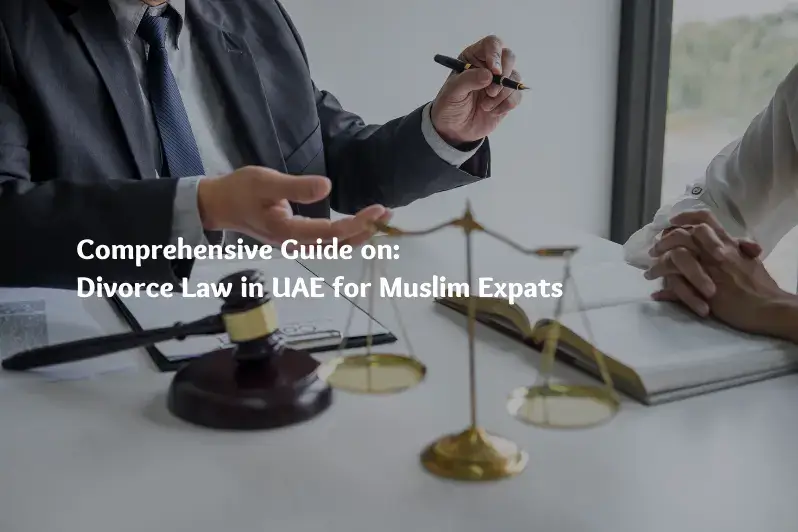This article provides an overview of the divorce law in UAE for Muslim expats.
Divorce laws in the UAE can be complex, and understanding the legal framework is crucial for non-UAE nationals.
We will explore how these laws apply, the divorce grounds, and the available legal support for 2025.
Get professional help from our lawyers in UAE. Click the WhatsApp icon below.
فهرس المقال
Overview of Divorce Law in UAE for Muslim Expats
Regarding divorce, Federal Decree-Law No. (41) of 2024 (UAE Personal Status Law) generally applies to all Muslim expats unless they apply their home country’s law.
In some cases, the couple can agree on which law to apply.
However, the provisions of this law primarily affect Muslim expats, offering specific rules on divorce, marriage, and family issues.
Grounds for Divorce in the UAE
Several grounds exist for divorce under the UAE law for Muslim expats. These include:
- Divorce by Husband: Divorce can be initiated by the husband through a verbal or written declaration. If he cannot express it in these forms, a comprehensible signal can be used.
- Khula’ (Wife-Initiated Divorce): If a wife seeks a divorce, she may offer compensation or her dowry to the husband in exchange for the divorce. Khula’ in UAE is considered a form of minor irrevocable divorce.
- Divorce by Court: Divorce may also be granted by the court due to reasons such as non-payment of dowry, desertion, or even harmful defects in the spouse that impede the continuation of the marriage (Divorce Due to Harm).
Read about Divorce Over Maintenance Failure.
Types of Divorce
Divorce can be classified into two main types: revocable and irrevocable.
A Revocable Divorce does not permanently dissolve the marriage until the wife’s waiting period is over. During this period, the husband can take the wife back.
An Irrevocable Divorce permanently ends the marriage. This can be minor (the first or second divorce) or major (after the third divorce).
Divorce for Specific Reasons
The law also provides for divorce in cases of desertion, absence, imprisonment, addiction, and other severe reasons.
For instance, if a husband is absent for six months or more without a valid excuse, the wife may file for divorce. Similarly, addiction to drugs or alcohol is grounds for divorce.
Rights and Documentation of Divorce
According to divorce law in UAE for muslim expats, the husband is obligated to document the divorce within 15 days, and failure to do so may result in the wife being entitled to compensation for alimony from the date of divorce until it is documented.
Marriage Contract Revocation
If one spouse suffers from an illness or defect that severely impacts the marriage, the other spouse has the right to request a revocation of the marriage contract.
This can be done if the defect prevents sexual pleasure or is deemed harmful (such as lunacy or leprosy).
Learn more:
- Divorce law UAE for expats.
- Divorce in Dubai.
- Divorce process by mutual consent.
- Filing Alimony Case Against Husband Residing in the UAE From Abroad.
Divorce Legal Services in UAE for Muslim Expatriates
Our lawyers and legal consultants in Dubai specialize in handling divorce cases for Muslim expats in the UAE.
We understand the unique challenges and cultural sensitivities involved in such matters. Our services include:
- Legal Advice on Divorce Options We offer clear guidance on the different divorce options available under UAE law, including divorce by the husband, Khula’ (wife-initiated divorce), and court-ordered divorce.
- Documenting and Processing Divorce Our legal team ensures that all divorce proceedings are properly documented and filed within the legal timeframes, protecting our clients’ interests.
- Representation in Divorce Cases We represent clients in court when necessary, ensuring that all legal procedures are followed and that our clients’ rights are safeguarded during the divorce process.
- Handling Divorce Due to Abuse or Addiction If divorce is being sought due to addiction or harmful behavior, we provide expert legal representation to ensure that our clients’ cases are thoroughly presented and their best interests are served.
- Negotiating Alimony and Maintenance We assist in the negotiation of alimony, maintenance, and other financial matters following a divorce, ensuring that our clients are adequately supported.
- Child Custody and Support Our firm provides legal counsel and representation in cases involving child custody and support, helping ensure the best outcome for both parents and children.
If you are a Muslim expat in the UAE seeking a divorce, our experienced legal team is here to provide expert advice and assistance.
We ensure that your rights are fully protected under UAE law.
FAQs about Muslim Expatriates’ Divorce in UAE
In conclusion, divorce law in UAE for Muslim expats is governed by specific provisions under the Personal Status Law.
If you are facing divorce, seeking expert legal counsel to navigate these laws effectively is essential.
Our law firm offers comprehensive services to guide you through every step of the divorce process and ensure that your interests are well-protected.
Contact our lawyers in the UAE for expert support. Click the WhatsApp icon below.





Very well written story. It will be beneficial to anyone who employess it, including yours truly :). Keep doing what you are doing – for sure i will check out more posts.